Which movies intrigued commentators at the 72nd Berlin International Film Festival, and which were disillusionments?

Beneath, we sum up the responses of pundits to every one of the striking movies appearing at the current year's Berlinale. We have assembled the movies into harsh classifications (from best to most awful) in light of how much pundits appeared to like them, starting with the current year's significant honor victors.
THE MAJOR AWARD WINNERS
Golden Bear (Best Film in Competition)
Alcarràs Drama | Spain/Italy | Directed by Carla Simon
Spanish chief Carla Simón brought home the top prize at the current year's celebration for this development to her very much respected introduction include Summer 1993. Her new movie imparts its name to the town in northwestern Spain where the chief's Catalan progenitors cultivated peaches for ages and filled in as the motivation for this anecdote about a family confronting the chance of losing their property. THR's David Rooney trusts this "ardent show" could be "all the more satisfyingly organized," however its "secrecy passionate effect is evident," and David Ehrlich of IndieWire views this as "humming and energetic gathering dramatization" to be "driven less by plot than feeling of spot," coming about in a "furiously unsentimental picture of a family near the precarious edge of losing their homestead." Screen Daily's Fionnuala Halligan thinks about it "very noteworthy that this is just [Simón's] second film," and in his survey for The Telegraph, Tim Robey expresses, "The extent of the film is so private and contained that examinations feel indolent, yet I was strangely helped to remember The Godfather at different places: everything without question revolves around the rich validity of the genealogy, the feeling of this part pulling both together and separated in a shuddering back-and-forth."
Silver Bear Grand Jury Prize (2nd Place)
The Novelist's Film
Drama | South Korea | Directed by Hong Sang-soo
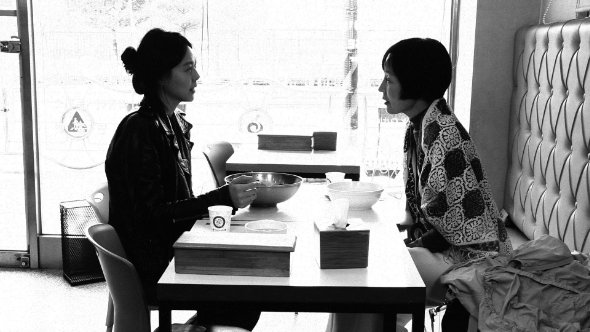
In the wake of winning the Silver Bear for Best Director in 2020 for The Woman Who Ran and Best Screenplay in 2021 for Introduction, Hong Sang-soo proceeded with his Berlinale series of wins this year by gathering the Silver Bear Grand Jury Prize for this account of a popular author (Lee Hyeyoung) who meets with a book shop proprietor, a movie chief, and afterward a renowned entertainer (Kim Minhee), bringing about the thought for a movie. THR pundit David Rooney trusts it's "apparently less a fundamental new section than a prodding commentary to all that he's done previously," while as yet having "shrewd humor and experiences into the frailties of the imaginative cycle." Johnathan Romney of Screen Daily is glad to see "a few limited scope however amazing conventional turns, and much perkiness," from the chief who additionally created, composed, shot, altered and scored this 27th component that Variety's Guy Lodge portrays as "another delicately circumlocutory, discussion driven charmer" that comes full circle in "a mind-set of curious creative self-cross examination that actually feels nimble and particular."
Silver Bear Jury Prize
Robe of Gems
Drama | Mexico/Argentina | Directed by Natalia López
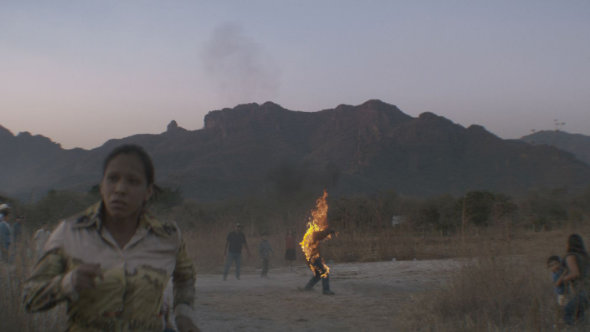
Mexican-Bolivian editor turned director Natalia López Gallardo (who previously worked on husband Carlos Reyadas’ Silent Light and Post Tenebras Lux as well as Lisandro Alonso’s Jauja) took home the Silver Bear Jury Prize for her debut feature, described by The Guardian's Peter Bradshaw as a “disturbing and unsettling piece of work, a psycho-pathological moodboard of a film, in which guilt, horror and shame poison the atmosphere.” Elliptically capturing the enduring and crippling impact of violence and kidnappings on Mexico’s people, the film “attempts to strike a balance between elliptical art house drama and gritty narcocorrido,” but for Jordan Mintzer of THR, López Gallardo “forges her own bold way, but loses us a bit in the process.” However, Jonathan Holland of Screen Daily is more in sync with this “visually stunning, thoughtful, and profoundly unsettling” film, finding it “creepy in all the right ways.”
BEST OF THE FESTIVAL
Flux Gourmet
Drama | UK/USA/Hungary | Directed by Peter Strickland
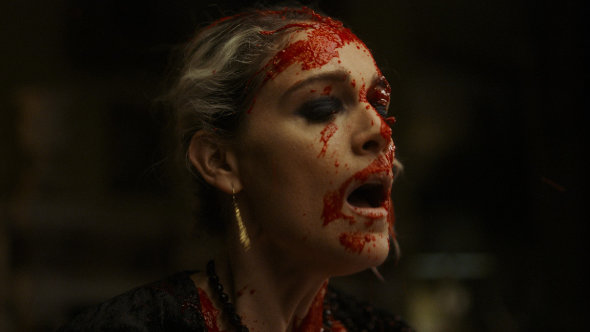
The new film from writer-director Peter Strickland (In Fabric, The Duke of Burgundy) is “a particular triumph,” according to Screen Daily's Wendy Ide, who adds, “The funniest of his films to date, it’s a fully realised, immaculately tailored creation which conceals a slow-burning sense of mischief under its deliberate oddness and ornately deadpan dialogue.” Flux is set at an institute devoted to culinary sound performance, where members of a collective (Fatma Mohamed, Asa Butterfield, Ariane Labed) find themselves embroiled in artistic and sexual affairs with each other and the institute’s director (Gwendoline Christie). The result is a film with “intellectual reach, emotional depth, and an almost scholarly attention to influences and sources,” writes David Katz of The Film Stage. In his review for The Playlist, Charles Bramesco adds, “This is Strickland’s grand act of prestidigitation; he coaxes out something like poignancy from the peculiar, just as he conjures the visceral and unknowable from ordinary groceries.”
Incredible But True (Incroyable mais vrai)
Comedy | France/Belgium | Directed by Quentin Dupieux
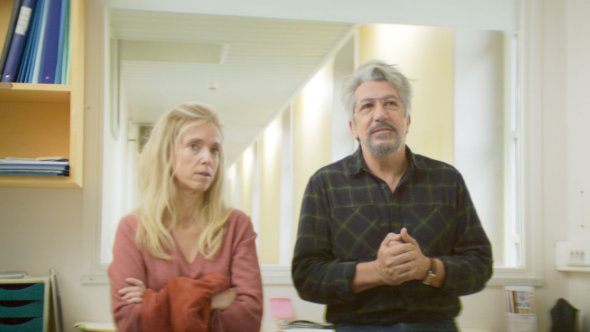
French musician/DJ (under the name Mr. Oizo) and absurdist filmmaker Quentin Dupieux (Mandibles, Deerskin, Keep an Eye Out) once again takes on writing, directing, editing, and cinematography duties to deliver a surreal comedy about a couple, Alain and Marie, who buy a house with a very special cellar. While Marie becomes obsessed with going down to the cellar, Alain is more circumspect. In his review for Screen Daily, Lee Marshall calls it a “minor but still fun-in-parts addition to his wacky oeuvre,” while THR's Jordan Mintzer is more onboard with this “worthy addition to a canon that keeps getting weirder with each film, taking the director so far into left field that he’s practically built another ballpark by now.” And The Guardian's Peter Bradshaw praises the film’s inventiveness: “New things happen and ridiculous developments briskly unfold in cheerfully preposterous montages.”
Nana (Before, Now & Then)
Drama | Indonesia | Directed by Kamila Andini
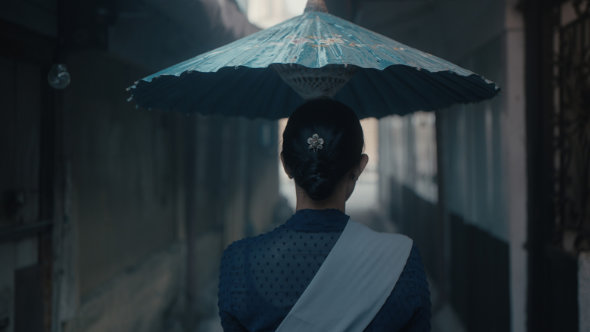
Kamila Andini’s fourth solo feature is set in Indonesia during the political turmoil of the 1960s. Nana (Happy Salma) has become the second wife of a rich Sundanese man, but her past, particularly the loss of her father and the disappearance of her first husband, continues to haunt her. In his review for Variety, critic Michael Nordine asks viewers to imagine “what “In the Mood for Love” might have been like had Apichatpong Weerasethakul directed it will land you somewhere in the vicinity” of Andini’s adaptation of Ahda Imran’s novel. The Film Stage's Rory O’Connor applauds the “deeply felt performances” of the ensemble, which led to Laura Basuki winning the Silver Bear for Best Supporting Performance at the festival. But the highest praise comes from THR critic Leslie Felperin, who writes, “The result is an intoxicating work that holds the viewer in a tight, loving embrace that won’t let go.”
Rimini
Drama | Austria/France/Germany | Directed by Ulrich Seidl
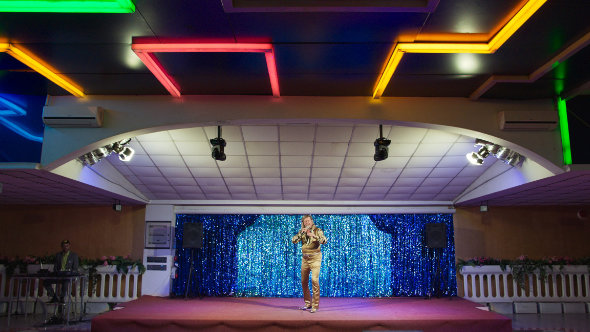
Titled after the Italian town where its lead character, Richie Bravo (Michael Thomas), croons for and then beds his fans, Austrian filmmaker Ulrich Seidel’s first narrative feature since 2013’s Paradise Trilogy (Love, Faith, Hope) is “not as scurrilously seedy as him at his worst, or as merciless, but not as ambitious or startlingly insightful as his best,” according to Leslie Felperin of THR. But The Guardian's Peter Bradshaw believes, “There is a kind of brilliance in it.” The first film in a planned diptych that will continue with Sparta, starring Richie’s brother Ewald, Rimini belongs to Thomas’ Bravo, who gives the film its “unifying comic vigour and pathos,” in the eyes of Screen Daily's Jonathan Romney. And in her review for Variety, Jessica Kiang finds this “challenging but riveting” film to be a “shiveringly precise slow burn that continues to burrow new tunnels in the mind long after it ends.”
This Much I Know to Be True
Documentary/Music | UK | Directed by Andrew Dominik
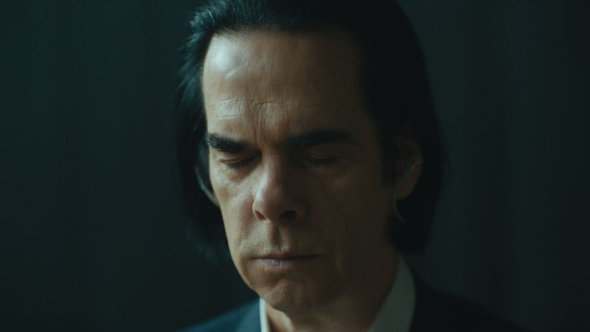
As anticipation grows for Blonde, his Ana de Armas-starring look at Marilyn Monroe, director Andrew Dominik, whose last narrative feature was 2012’s Killing Them Softly, proves once again to be an adept documentarian when his subject is Nick Cave. A companion piece of sorts to their piercingly intimate 2016 collaboration, One More Time with Feeling, which found Cave reckoning with the loss of his son through his music (specifically the album Skeleton Tree), This Much I Know To Be True is more concert film than its predecessor, but no less personal thanks to the relationship shared by Dominik and Cave. Focusing out songs from Ghosteen and Carnage, it’s “simply executed but undeniably powerful in its lean, stripped back elegance,” according to Screen Daily's Wendy Ide, who finds “sorcery is at work” when Cave and Warren Ellis are joined by Marianne Faithful. In her review for The Playlist, Rafaela Sales Ross writes, "Its cinematic prowess is not only a reflection of the director’s technical expertise and his insight into capturing their soulful, elegiac music, but also a testament to the depth of the relationship built between subject and framer.”
OTHER NOTABLE DEBUTS (GOOD BUT UNEXCEPTIONAL)
Coma
Drama/Experimental | France | Directed by Bertrand Bonello
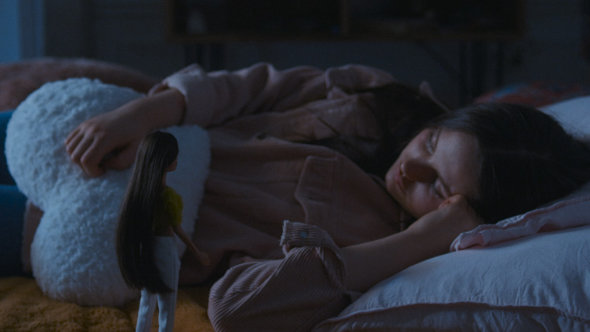
Writer-director Bertrand Bonello (House of Pleasure, Nocturama, Saint Laurent) continues to follow his own idiosyncratic muse with this pandemic project dedicated to his daughter, played here by Zombi Child's Louise Labeque. Combing a soap opera played out by talking dolls, archival footage, Zoom calls, and an invented YouTube influencer named Patricia Coma, this cinematic essay divided critics. In his review for Variety, Michael Nordine calls it a “jumbled mess,” and Screen Daily critic Allan Hunter admits “Bonello’s scattershot, kitchen sink approach can grate,” but the latter also finds the “wide-ranging, experimental combination of extended therapy session and state-of-the-nation essay” to be “often intriguing.” For The Playlist, Rafaela Sales Ross colorfully describes the film: “An unforgiving, nightmarish blast, Coma is a cinematic bout of irritable bowel syndrome, afflicting yet unavoidable, disgustingly painful until it finally meets the joy of relief.”
Drama | France | Directed by Claire Denis
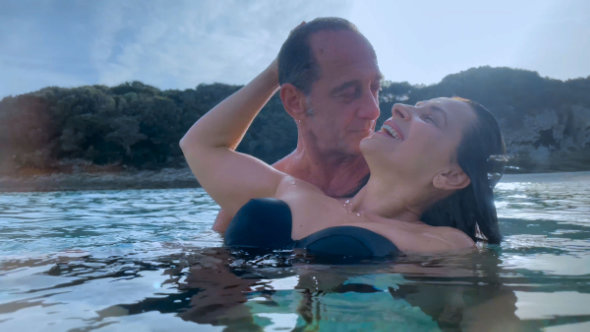
Claire Denis won the Silver Bear for Best Director for this second collaboration, following Let the Sunshine In, with writer Christine Angot and star Juliette Binoche. The latter plays Sara, a woman caught between her loving, stable partner Jean (Vincent Lindon) and his best friend and her former lover, François (Grégoire Colin). THR's David Rooney deems Fire a “smart, moody, superbly acted melodrama,” while The Guardian's Peter Bradshaw finds it “intriguing if contrived and anticlimactic, though acted at the highest pitch of sensual conviction.” And for Tim Robey of The Telegraph it has an “impetuous, let’s-try-it-on quality that makes it a modest pleasure.” More taken with the film is IndieWire's David Ehrlich, who writes, “Her freeform imagination inflamed by the social immobility of the pandemic, Denis creates a contained backdraft of a film that’s as volatile and untamed as an inferno.”
The Line
Drama | Switzerland/France/Belgium | Directed by Ursula Meier
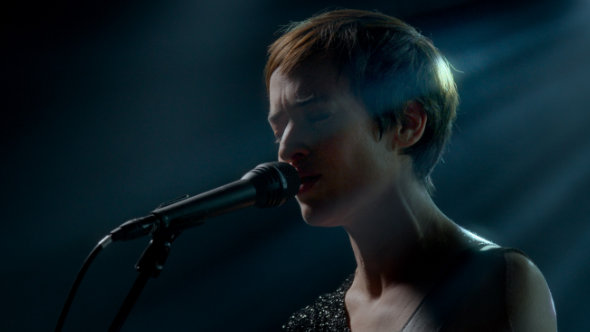
The latest from French-Swiss director Ursula Meier (Home, Sister) is a family drama about Margaret (Stéphanie Blanchoud, who also co-wrote the script), a volatile young musician who returns home to live with her mother Christina (Valeria Bruni Tedeschi) only to find herself forbidden to come within 100 meters of her after she strikes her during a furious argument. Screen Daily's Lee Marshall believes this “story with a brilliant conceptual framework” feels “in the end like the kind of dysfunctional family drama we’ve seen so many times before,” but Peter Bradshaw of The Guardian claims it’s an “engrossing, unnerving but unexpectedly sympathetic drama of family dysfunction.”
Drama | USA | Directed by Graham Moore
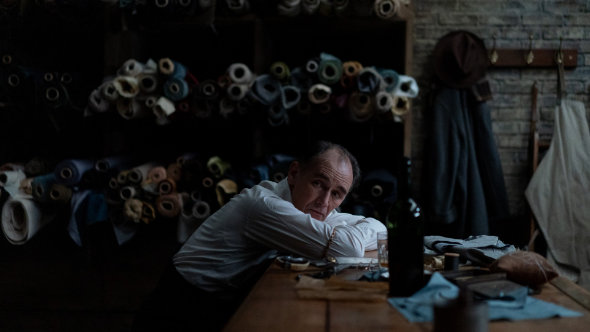
This feature directing debut from Oscar-winning writer Graham Moore (The Imitation Game) stars Mark Rylance as an expert tailor whose survival depends not on his finely crafted clothes but his ability to outwit a dangerous group of mobsters. Co-written with Johnathan McClain, the “film cheerfully bluffs and misdirects, but crucially it never cheats,” writes Robbie Collin of The Telegraph. But in his review for TheWrap, Robert Abele disagrees: “With an air of duplicitousness telegraphed early on, and a handful of scenes coming off like information dumps instead of natural exchanges, many of the story mechanics strain for believability.” Writing for IndieWire, Siddhant Adlakha sides with Abele but likes the film more overall, noting, “The further it gets into its 105-minute running time, the more noticeable its seams become, distracting from an otherwise finely-textured fabric.” But Screen Daily's Nikki Baughan believes it’s a “thrill to watch” a “master craftsman” life Rylance in this “beautifully designed, carefully measured and expertly cut” film. One of the few Berlinale films with a confirmed release date, The Outfit heads to North American theaters on March 18.
The Passengers of the Night (Les passagers de la nuit)
Drama | France | Directed by Mikhaël Hers
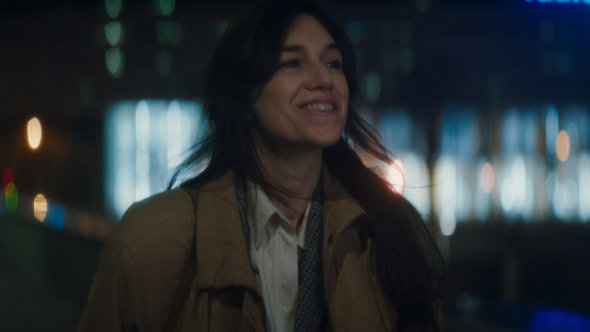
Writer-director Mikhaël Hers’ follow-up to 2018’s Amanda stars Charlotte Gainsbourg as Élisabeth, a woman whose marriage has dissolved, leaving her responsible for the care of her two children. Beginning in 1981 and covering many years in Élisabeth’s life, the film is, in the view of Screen Daily's Wendy Ide, “a gentle, wafting piece of storytelling which zeros in on seemingly inconsequential but intimate moments in the lives of the family at its heart.” Jude Dry of IndieWire's agrees, writing, “Like a cinematic meditation, the minutiae of life are rendered achingly gorgeous under Hers’ careful direction.” In her review for The Playlist, Rafaela Sales Ross adds, “Hers’ ode to the beauty of shared moments is contemplative yet never drab, quiet yet full of verve.”
Peter von Kant
Drama | France | Directed by François Ozon
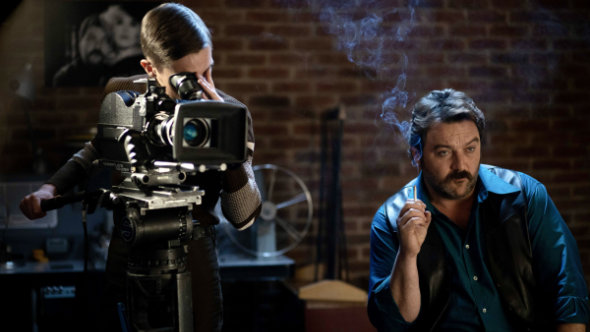
The prolific writer-director François Ozon (Double Lover, By the Grace of God, Summer of 85) returned to Berlin for the sixth time with this gender-flipped reimagining of Rainer Werner Fassbinder’s The Bitter Tears of Petra von Kant. Instead of a fashion designer, the lead character, played with great commitment by Denis Ménochet, is a male film director who becomes obsessed with a beautiful young man played by newcomer Khalil Gharbia. The Guardian's Peter Bradshaw finds it “a lot more genial, campy and comic than Fassbinder’s gaunt ordeal,” and in the opinion of Tim Robey of The Telegraph, the “liveliness” of Ozon’s film “sacrifices the glacially protracted, teatime-at-the-mausoleum quality that made Fassbinder’s film so mesmerising.” But Screen Daily's Jonathan Romney is more positive: “Both homage and critique, Peter von Kant astutely gets under the skin of the lesbian-themed original, ekes out new resonances and proves both authentically Fassbinderian and altogether Ozonesque in its ironic sensibilities.”
THE DISAPPOINTMENTS
Dark Glasses (Occhiali neri)
Horror/Thriller | Italy | Directed by Dario Argento
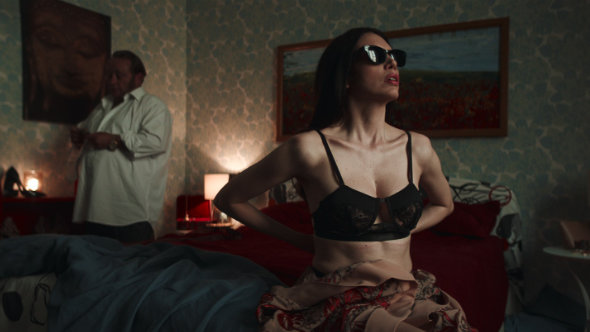
The 81-year-old Italian director who gave the world Deep Red, Suspiria, and Phenomena directs his first feature since 2012’s disappointing Dracula 3D. While this story of a blind high-end prostitute trying to defend herself against a serial killer is better than Dario Argento’s last outing, it doesn’t stack up to his classics. For The Guardian's Peter Bradshaw, Dark Glasses “has its moments of macabre and melodramatic invention,” and in his review for The Film Stage, Rory O’Connor finds it “pretty fun, for a while—and no, not near his best.” THR critic Jordan Mintzer admits it’s “both a little ridiculous and a tad endearing, capturing the Suspiria director at his softest,” and The Playlist's Elena Lazic picks up on that too, concluding, “Together with the firm confidence of its execution, perhaps it is this sincerity that marks Dark Glasses as a touching late work from a master.“
Nobody's Hero (Viens je t’emmène)
Comedy | France | Directed by Alain Guiraudie
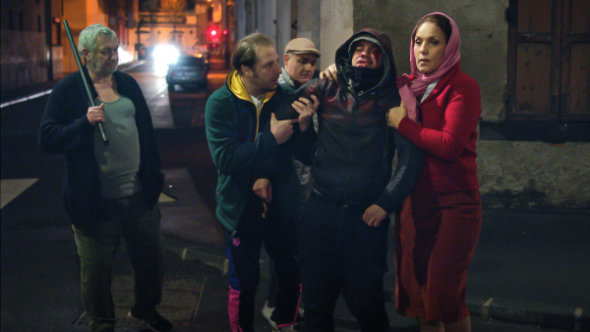
Writer-director Alain Guiraudie’s international breakout was 2013’s Stranger by the Lake, but that Hitchcockian thriller might prove to be the outlier in his filmography based on the evidence of his follow-up, Staying Vertical, and this new story of Médéric, his married sex worker crush Isadora, and Sélim, a young man they take in after a terrorist attack occurs on Christmas Eve. For THR's Jordan Mintzer, it’s a “somewhat uneasy mix of social critique and bizarre sex drama in which Guiraudie seems to be spitballing different ideas without making all of them stick,” and in his review for IndieWire, Nicolas Barber warns, “It feels as if Guiraudie had two separate ideas for a contemporary urban comedy but couldn’t figure out how to develop either of them, so he stuck them in one script and hoped for the best.” The Guardian's Peter Bradshaw describes Hero as a “romp, but a very flavourless romp,” and for Wendy Ide of Screen Daily, “tonal inconsistencies are just one of the problems with a film which inadvertently perpetuates the very stereotypes and assumptions that it tries to satirise.”
Taurus
Drama | USA | Directed by Tim Sutton
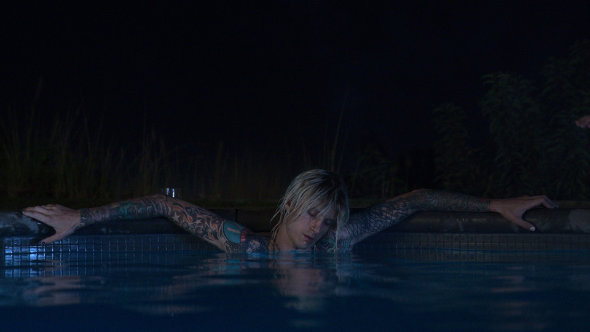
The latest from writer-director Tim Sutton (Pavilion, Dark Night, Donnybrook) stars Colson Baker (aka Machine Gun Kelly) as Cole, a rapper who struggles to survive in the toxic whirlwind of fame and addiction. For Screen Daily's Lee Marshall, Taurus “feels like a montage of rockstar clichés,” and in her review for THR, Angie Han complains that it “feels for most of its 98-minute run time like a plotless meander through one dude’s very awful week.” But the film does have its admirers, including Slant's Mark Hanson, who believes “Baker upends any expected notions of an insipid vanity project by making Cole’s turbulent interiority echo even louder than his frenzied performance style.” And Tim Robey of The Telegraph admits this “story, if it can even be called that, is Page Six gossip fodder with haters out in force in the comment fields. I thought I was hating it myself, until the moment it started to feel deeply believable.”

إرسال تعليق